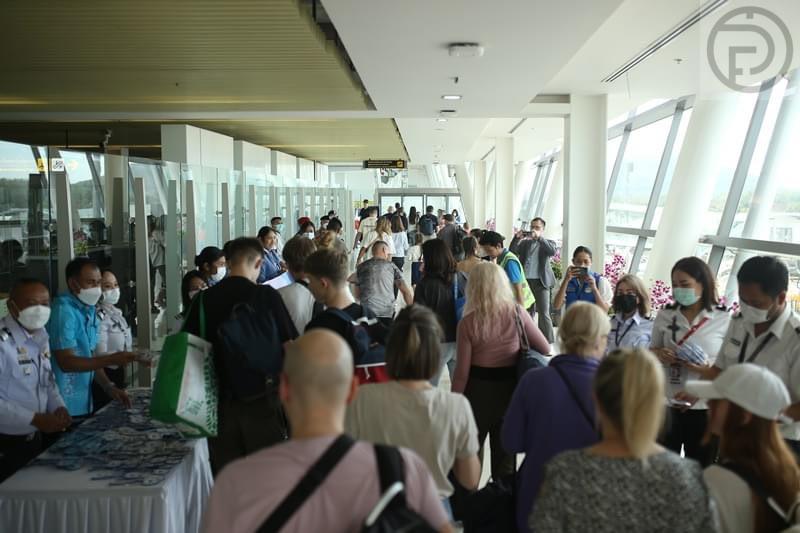Definitive US inflation data showing lower inflation figures interpreted by the markets this time as meaning the Federal Reserve might be more inclined to reduce the level of future interest rate hikes. This and signs of life from China that its economy may be ready to relaunch after a disturbing shutdown imposed by authorities to fight the pandemic, has been enough to send the baht surging against the US dollar since October 19th last.
Thailand's economy and currency have come thundering back in the last three weeks with the baht's value soaring through multiple barriers to hit ฿35.93 to the US currency while both consumer and industry confidence are on the rise. The country's inflation rate has also been ticking downward while the kingdom finds itself at the bottom of the scale, ranked 107 out of 130 countries, on the basis of inflation, far behind developed economies such as the United Kingdom, United States and Germany.

The Thai currency has staged a rapid comeback against the US dollar in the last three weeks which has seen the world's default currency fall in value by 6.2% against the baht.
On October 19th, the greenback was valued at ฿38.31 and by Saturday 12th November, this had fallen to ฿35.93 breaking through three barriers in what appears to be a rapid decline in the value of the dollar.
Baht at its highest point in five months against the US dollar as economic data shows Federal Reserve's medicine may be working to tamp down inflation
The baht is now at its highest point in some five months with the turnaround being attributed to signs of a reopening of the Chinese economy and definitive data from the United States showing that inflation has begun to taper down.
The latest data from the United States shows the consumer price index rose 7.7% in October down from 8.2% in September.
This was based on a US Labour Department report.
The figure was even better because core inflation rose by only 0.3% from the previous month.
Bank of Thailand official urges caution and still advises both importers and exporters to hedge against future currency trends, fearing ongoing volatility
However, analysts are urging caution with even the Bank of Thailand, while appearing to welcome the stronger baht based on renewed investor confidence in the kingdom, telling the country's importers and exporters to, nevertheless, prepare for volatility ahead and that they should adopt hedging measures.
While many market analysts in the United States are surmising that the latest figures may mean the Federal Reserve can ease off on the size of future interest rate hikes which are still expected, its chairman Jerome Powell, earlier this month, warned that interest rates would end up higher than the market is currently expecting on the basis that the United States cannot afford to take chances with the possibility of continued inflation which must be subdued and brought back to targeted policy levels.
In Bangkok, the Kasikorn Research Centre's Kanchana Chokpaisarnsilp noted that the rise in the baht has also been linked to the trajectory of the Chinese Yuan.
Economic analyst sees a link between the trajectory of the Thai currency and that of the Chinese Yuan
This is something that has been a more pronounced trend in recent decades and may be linked to the interconnected nature of the relationship between China's economy and Thailand's.
In Singapore, Mr Christopher Wong, a foreign exchange expert with the Oversea-Chinese Banking Corp, saw the slide in the dollar as more connected with US inflation data and heralded it as possibly good news for emerging economies whose currencies have been hammered in 2022.
'A softer dollar should create a conducive environment for stretched Asian currencies to rebound,' he said. He also saw a higher upside for the Thai baht and the South Korean won. 'Some of those that could benefit more on a relative basis include the baht and the won.'
Senior Bank of Thailand executive heralds new confidence in Thailand with over ฿107 billion in foreign purchases in the stock and bond markets
In Bangkok, Ms Chayawadee Chai-Anant, Assistant Governor of the Bank of Thailand saw the sharp change in fortune for the baht as indicating renewed investor confidence in Thailand in addition to US data showing a softening in inflation stateside.
She also noted that the baht had gained more than 5% against regional currencies and outlined that foreign buyers have this year invested ฿107 billion in Thai securities comprised of ฿89 billion in bonds and ฿18 billion in the Stock Exchange of Thailand (SET).
Earlier this week, the good news for the economy kept coming with the Vice President of the Federation of Thai Industries (FTI), Montri Mahapruekphong, unveiling a fifth consecutive month of rising confidence among industrialists with the index recorded at 93.1 in October compared to 91.8 in September.
Senior industrialist still warns of tightening monetary policy in Thailand with a gradual rise in interest rates being planned by the Bank of Thailand
At the same time, Mr Montri warned of rising interest rates with the Bank of Thailand still pursuing a tightening of monetary policy but at a gradual pace in an effort to keep inflation in the kingdom under control while not impeding growth with the same sort of rate hikes seen in the United States.
Baht slide continues as Bank of Thailand sticks to its dovish and soft approach to interest rates
This policy has been one of the reasons attributed to the lower Thai baht which hit a sixteen-year low on October 19th last.
The Thai base interest rate is currently at 1%, well below the 3.75% to 4.25% in the United States which is expected to rise further.
The Thai rate is expected to rise to 1.25% by the end of 2022 with further increases expected in 2023.
The industry leader called for government incentives to manufacturing businesses including corporate tax breaks for capital expenditure on plant and machinery to assist the country's economic recovery.
Welcome for the government's 2023 spending stimulus plans which the Fiscal Policy Office says can be partially self-financing while boosting GDP
The Federation of Thai Industries (FTI) senior official welcomed the government's planned stimulus measures, administered by the Ministry of Finance, pencilled in for early in the new year to encourage consumer spending in a boost to economic growth prospects.
Recent studies from the Fiscal Policy Office have shown that such programmes generate significant gains for the economy in terms of GDP growth and can be partially self-financing through additional tax revenue if managed properly.
Last hurrah for economic stimulus in the opening months of 2023 says Finance Minister before focusing on balanced budgets with higher taxes
Mr Montri also urged the government to introduce schemes to keep electricity prices stable in 2023 for industry to help maintain Thailand's competitive position which is the key to driving exports.
Higher consumer confidence as inflation has trended down led by food and energy costs where the annual inflation rate has fallen back with lower prices
Thailand's consumer confidence in October also reached a new 10-month high.
Data from the University of the Thai Chamber of Commerce (UTCC) showed it reached 46.1 in October from 44.6 in September.
Thailand's inflation rate for October was 5.98%, falling for the second month and putting the kingdom on course for an annualised inflation rate of 6% for 2022.
The consumer price index, as published by the Trade Policy and Strategy Office at the Ministry of Commerce, was 108.6 for the month compared to 101.96 in September.
Director Poonpong Nainapakorn said the price of oil, fuel and food had all reduced and attributed this to close cooperation between the public and private sectors.
He said the rising cost of living had been slowed by external events and initiatives from the government and private firms.
Food inflation rate in Thailand was 9.58% in October with fresh foodstuffs up by 10.48% from a year ago
Nevertheless, food and non-alcoholic beverages had an inflation rate of 9.58% in October with fresh food this year up by 10.48% including foodstuffs such as chicken, pork, soy sauce, curry paste, rice and flour.
Energy prices rose 13.07% in October although the rate of growth slowed from 16.1% in September.
Mr Poonpong said that prices from September to October had appreciated by only 0.33% overall with a sharp drop in the price of fresh food and energy costs, which if excluded would have left an appreciation rate of 3.17%.
'Inflation in November and December is expected to continue to decline. It is unlikely to grow as high as 6% because prices of essential consumer goods have begun to slow down. The flood began to ease, causing more agricultural products to enter the market in the past 10 months. The Dubai crude oil price is moving at $99.14 a barrel and the baht is at 35.96 baht to the US dollar which is still within the framework of the expected assumptions. But there are still risk factors from higher energy prices from the tight supply of crude oil therefore need to be closely monitored. As for inflation this year, it is expected that it will be between 5.5% to 6.5% or the median is 6.0%, which is the rate in line with the economic situation and inflation forecasts of the Thai economic authorities.'
Mr Poonpong highlighted that inflation in Thailand this year has been significantly lower than in most countries with the kingdom ranking 107 out of 135 countries globally experiencing higher levels of inflation.
Thailand's inflation rate was significantly lower than that of the United States, Singapore, the United Kingdom, Italy, Germany, the Philippines, India and Laos.



















